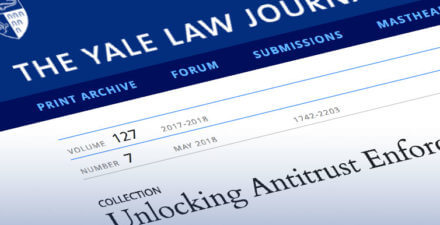Introducing the “Competitive Edge” blog series

Today marks the fifth installment of Equitable Growth’s recently launched “Competitive Edge” blog series, which features experts in antitrust law on a broad range of subjects, including the state of enforcement today, proposals for reform, potential policies that promote competition, and the practical realities that enforcers face. Competitive Edge provides a platform for experts, particularly those with enforcement experience, to add their voices to the important antitrust policy debates that are occurring.
The image for this blog series (seen above) reflects our goals. A harpoon is aimed squarely at an octopus that controls various industries. The octopus is an updated version of an iconic image for monopoly, taken from a 1904 publication of Puck magazine that portrays the then-monopolistic stranglehold of Standard Oil Co. We hope this blog series helps promote and sharpen effective tools to increase competition in the United States economy. Equitable Growth now has a landing page for the series, where readers can find all the contributions.
In the inaugural post, Fiona Scott Morten, former deputy assistant attorney general for economics at the Antitrust Division of the U.S. Department of Justice, takes up the challenge of describing what more antitrust enforcers could be doing under current law—specifically, what types of cases enforcers should investigate. Discussing papers (supported by Equitable Growth) presented at The Yale Law Journal symposium (also supported by Equitable Growth), Morten explains that “The Yale Law Journal issue lays out an initial roadmap of cases that are well-grounded in economic analysis and legal precedent” and “would make U.S. markets more competitive.” Potential targets for enforcement identified by Morten include conduct deterring challenges to online platforms, market power possessed by buyers, predatory pricing, and vertical mergers.
The second contribution, by former Director of the Federal Trade Commission’s Bureau of Economics Howard Shelanski and Equitable Growth’s Director of Markets and Competition Policy Michael Kades, discusses what then-U.S. Court of Appeals Judge Brett Kavanaugh’s elevation to the U.S. Supreme Court might mean for antitrust law, examining his dissents in two antitrust cases. Specifically, they write, his rigid Chicago School approach holds the potential to weaken the antitrust law’s limitations on mergers. His high bar for finding violations hints at a preference for loosely enforced antitrust laws.
Next, former Deputy Assistant Attorney General in the Antitrust Division of the U.S. Department of Justice Jonathan Sallet weighed in on the Federal Trade Commission’s series of hearings regarding the current state of competition and the debate over the “consumer welfare” standard: what it is, what role it plays in antitrust law, and whether it is still the appropriate standard today. He explains both sides of the argument but ultimately states that discussions around the protection of competitive processes are key to solidifying the strength of antitrust enforcement.
In November, former Federal Trade Commissioner Terrell McSweeny addressed the challenges artificial intelligence and algorithms pose for antitrust enforcement. McSweeny recommends an independent bureau within the enforcement agencies that is dedicated to the enforcement of antitrust laws in the technology sector. In addition, she emphasizes the need for enforcers to educate themselves on the changes in technology and how such changes impact competition.
Earlier today, John Kwoka, the Neal F. Finnegan Distinguished Professor of Economics at Northeastern University, provided one recommendation for improving merger enforcement: restore the 50-year-old legal doctrine called the structural presumption. Under this rule, mergers that lead to concentration above certain levels are presumed illegal. Over the past several decades, both the courts and the antitrust enforcement agencies have weakened the structural presumption. Using data on the effects of mergers and agency enforcement rates, Kwoka advocates for the revival of the structural presumption as a means of advancing antitrust enforcement without burdening agency resources.
Keep an eye out for the next installments of the Competitive Edge blog series, coming in 2019!



